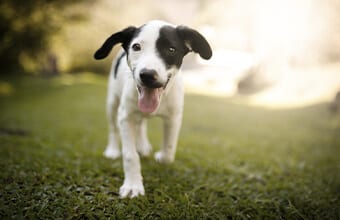Having a male dog neutered in Zion, IL is a common and extremely safe practice today, but there are still plenty of dog owners that choose not to neuter their dogs. Most dog owners have no intention of allowing their dogs to breed. However, any male dog left intact can and will find a mate against seemingly impossible odds. These unplanned litters of puppies add to a severe pet overpopulation problem. Some statistics suggest that approximately 670,000 dogs are euthanized annually in the US alone. By itself, this should be reason enough to neuter your dog, but other issues could arise that some male dog owners may not consider.
Are There Any Other Reasons to Neuter My Dog?
Health Benefits
Preserving your dog’s health is another excellent reason to neuter. Testicular tumors are thought to occur in as many as one-in-four intact males. This risk is eliminated by neutering. Prostate disease, testicular tumors, perianal tumors, and perianal hernias are common in older intact male dogs. Neutering can reduce or eliminate these risks as well.
Behavioral Benefits
A neutered male dog is often calmer, easier to train, and more affectionate. Neutering will not change a dog’s inherent personality, intelligence, or innate drive. Neutering will reduce sexually motivated male behaviors such as roaming, aggression towards other male dogs, mounting, and marking tendencies. The behavior benefits of neutering are likely reduced after the dog has gained any sexual experience.
On the other hand, you may have heard that neutered dogs get fat and lazy. But the truth is, just like their humans, overeating, feeding low-quality food, and lack of regular exercise causes them to be overweight. Having your dog neutered at a young age allows for better social conditioning with other dogs and people. It can be embarrassing and potentially dangerous to integrate an intact male at the local dog park, pet store, or local farm supply. Male aggression can lead to your dog being banned from doggy daycare and denied dog walker services.
A well-trained dog is a better companion, less likely to suffer injury, and can be trusted in social situations. A dog that does not obey simple commands such as come, sit, stay, and drop it can get into trouble both at home and in public. Neutered male dogs have fewer hormone-driven distractions, making them more receptive to training. Also, it is safer to take them to training classes where other dogs are present and professional training assistance is available.

At What Age Should I Neuter My Dog in Zion, IL?
Time is of the essence when deciding to neuter your male dog, as younger dogs typically have fewer issues during and after the surgery. The American Animal Hospital Association (AAHA) recommends small breed male dogs be neutered as young as six weeks of age but advises that larger breed males be allowed to complete their growth cycle, typically between nine and fifteen months of age. For clarification, the AAHA defines small breed dogs as those with a potential adult weight under 45 pounds and large breeds over 45 pounds as adults.
Neutering your dog pre-puberty is most often recommended. However, there are some cases where neutering post-puberty is recommended despite the increased risks. In general, the most significant risk to post-puberty neutering is related to issues occurring while under anesthetic. Dog neutering post-puberty to limit sexual behaviors like roaming, aggression, or mounting can still be effective. Most often, the neutering of older dogs is performed in conjunction with other surgeries. These may include procedures to correct conditions such as perianal tumors, perianal hernias, prostate disease, or other testicular issues.
Are There Any Risks Associated with Dog Neutering?
As with any surgery, there is always some inherent risk. Although uncommon, blood clots, infections, adverse reactions to the anesthetic, and ruptured sutures, are issues to discuss with your veterinarian before surgery. Modern anesthetics and techniques have significantly reduced these risks.
It should also be noted that neutering a dog is a standard procedure on the simpler end of the scale as far as surgeries are concerned. Choosing a reputable veterinarian, having the procedure done at the proper age, and providing proper aftercare can help to ensure a safe, pain-free experience for your dog.
What Should I Expect After My Dog is Neutered?
Your veterinarian should keep your dog in their care until they have recovered from the anesthetic. After recovery, your dog may still be feeling some lingering effects of the anesthetic, and he may be a little drowsy. At this point, it is crucial to keep your dog inside and in a quiet place where they feel safe. You should prevent your dog from overexerting himself by keeping him away from other animals. For up to two weeks following the surgery, you should discourage any play that involves chasing, tugging, or jumping.
The incision must remain clean and dry and should be checked every day. You should look for signs of infection such as redness, swelling, discharge, or a foul odor. If any of these occur, you should immediately contact your veterinarian. Licking the incision site is another thing to watch for. If your dog continually licks the incision, he may be fitted with a cone, or your veterinarian may recommend something else.
Neuter Your Dog in Zion, IL at Gray Animal Hospital
If you have questions about dog neutering in Zion, IL or would like to set up an appointment for your dog, please give Gray Animal Hospital a call at (224) 304-0668 or make an appointment online today!
